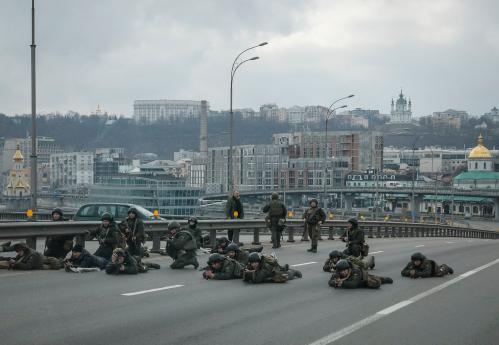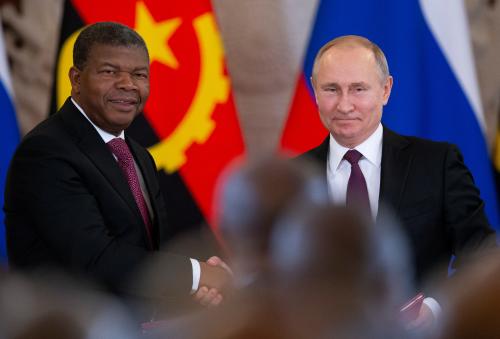The following piece is based on fast-moving events, and the analysis captures circumstances at the time of writing.
As in the rest of the world, Russia’s invasion of Ukraine on February 24 is casting a long shadow across Africa. Despite the geographical distance, there are important ties between Ukraine and Africa, including more than 8,000 Moroccans and 4,000 Nigerians studying in Ukraine and over $4 billion in exports from Ukraine to Africa.
Although some African countries may benefit from a shift in global markets away from Russia due to the crisis, the short-term potential impacts on economic livelihoods are worrying while the implications for pan-African solidarity and adherence to multilateralism increasingly uncertain.
Benefits for natural resource exporters
A few countries are sensing long-term growth opportunities from the crisis. Specifically, Africa’s natural gas could reduce Europe’s dependence on Russian energy. For example, Tanzania’s president, Samia Suluhu Hassan, stated in an interview on the sidelines of the European Union (EU)-African Union (AU) summit in mid-February that the tensions in Ukraine are generating growing interest in the country’s gas reserves, which are the sixth-largest in Africa. Her nationalist predecessor, the late President John Magufuli, suspended talks with natural gas investors in 2019 to review the country’s production sharing agreement regime. Hassan, however, favors a more business-friendly approach and has revamped negotiations with energy companies in the hopes of attracting $30 billion in foreign investment to revive construction of offshore liquified natural gas projects in 2023.
Several other countries could similarly benefit from Europe’s energy diversification, including Senegal, where 40 trillion cubic feet of natural gas were discovered between 2014 and 2017 and where production is expected to start later this year. Nigeria, already a supplier of liquified natural gas (LNG) to several European countries, is also embarking with Niger and Algeria on the Trans-Saharan Gas Pipeline to increase exports of natural gas to European markets. On February 16, the three countries signed an agreement to develop the pipeline, estimated to cost $13 billion. Europe is likely to be a key financer, bolstered by the EU’s controversial decision in early February to label investments in natural gas as “green” energy.
Besides natural gas, further sanctions on Russia might benefit other natural resource exporters in the region. For instance, South Africa is, after Russia, the world’s second-biggest producer of palladium—a critical input into automobiles and electronics—and therefore could experience growing demand as a result of international sanctions placed on Russia. Similarly, as a major exporter of gold, the South African rand has been strengthening as a result of rising global prices for the precious metal.
Household vulnerability from fuel, fertilizer, and food impacts
Despite these possibilities, in the near term, the invasion of Ukraine could pose hardships for African households, the agricultural sector, and food security. The rising price of oil on global markets—induced by the crisis in Europe—will have direct impacts on the cost of transport. In fact, South Africa’s automobile association predicts that March will bring record-high fuel prices to that country. In Zambia, which agreed to cut fuel subsidies in order to adhere to post-pandemic debt negotiations with the International Monetary Fund (IMF), rising costs will make such reforms even more unpopular than they already were. Much to the disappointment of the IMF, last month, Nigeria already backed away from its plans to cut fuel subsidies after planned protests from labor unions and opposition parties.
Rising energy costs also affect the production of fertilizer, which is often a necessary input for a productive agricultural sector. The costs of urea and phosphate—two major components of fertilizer—had already risen by 30 and 4 percent, respectively, by the end of 2021. These increases, plus fertilizer export bans by China and Russia through at least June 2022, will cause the cost of fertilizer to rise. In Africa, low natural soil fertility means that chemical fertilizer is often essential for food production, and several countries have had fertilizer subsidy schemes in place since the Abuja fertilizer summit in 2006 and food price crisis of 2008/2009. Yet, continued climbing prices will further reduce the already narrow fiscal space many African governments are negotiating in the wake of COVID-19. The rising cost of fertilizer will also elevate food costs.
For several African countries, high dependence on wheat imports from Russia or Ukraine poses a further immediate concern. Jointly, the two countries constitute almost 30 percent of global wheat exports. Investors and market analysts have worried about Russia blockading Ukraine’s Black Sea ports, which would prevent Ukraine from exporting the remainder of last season’s wheat harvest. As noted in a recent analysis in Foreign Policy, much of Ukraine’s most fertile agriculture land is in the east of the country where Russian attacks commenced. Moreover, some experts have warned that, should the war drag on, Russia could also impose export tariffs on its wheat to improve its food security. When Russia annexed Crimea in 2014, wheat prices increased by 25 percent over two months. Due to the current geopolitical tensions, all major wheat exporters reported higher prices over the past month.
Importantly, during the 2020-2021 agricultural season, Africa—north and south of the Sahara—represented 36 percent of Ukraine’s total wheat exports and was by far the largest regional destination. Kenya, which imports most of its wheat from both Ukraine and Russia, has seen rising food prices in recent weeks that are generating growing anger on social media. Elsewhere in East Africa, importers of wheat from the Black Sea region are already facing extremely volatile social and political circumstances that could be worsened by rising food prices. For instance, several years ago, Russia began to replace Australia as the main source of wheat imports into Sudan. The retail price of wheat and wheat flour had already increased due to a blockade by protesters of imports from Port Sudan in October 2021, resulting in staples prices being, on average, 100 to 200 percent higher than they were last year. In a country where politics are deeply intertwined with the price of bread, elevated wheat prices will further fuel civilian anger and demonstrations in Khartoum about the military coup in October 2021. In Ethiopia, changing diets have meant that wheat constitutes 14 percent of the country’s total caloric intake, and the country relies on imports to satisfy 25 percent of local demand. After the U.S., Ukraine is the country’s biggest source of wheat and wheat flour imports—meaning that price spikes caused by a Russian invasion would exacerbate already high levels of food insecurity generated by Ethiopia’s civil war.
Regional solidarity will be tested
Finally, while most attention has focused on the implications of this crisis for trans-Atlantic relations and NATO unity, the invasion of Ukraine presents a significant test of the concept of pan-African solidarity and regionalism. In recent months, the set of institutions intended to represent this solidarity—from the African Union (AU) to the Economic Community of West African States (ECOWAS) as well as the Southern African Development Community (SADC)—have been undermined by conflicting views among heads of state over how to handle the spate of coups in the Sahel and rising insurgency across the continent. In Burkina Faso, the Central African Republic, Guinea, and Mali, large-scale protests have featured citizens prominently waving the Russian flag and military leaders inviting Russian mercenaries from the Wagner Group to tackle jihadists.
By contrast, the AU’s own Constitutive Act in 2002 supports the inviolability of borders and the norm of territorial integrity. On Thursday, the continental body condemned Russia’s invasion and called for an immediate ceasefire. Kenya’s ambassador to the United Nations underscored in February 2022 that a Russian invasion would undermine Ukraine’s territorial integrity and sovereignty. The Ghanaian ambassador echoed a similar sentiment, lamenting Russia’s decision to recognize parts of eastern Ukraine and abandoning the Minsk agreements.
More generally though, the conflict has put many African leaders in a difficult position and attempting to forge a neutral position. South Africa’s neutrality had for weeks frustrated EU and Ukrainian diplomats who nonetheless recognize its special role with Russia via the BRICs (Brazil, Russia, India, China, and South Africa) grouping of middle-income countries. Only after the invasion on Thursday did the South African government finally take a stronger stance, calling for Russia to withdraw its forces. Significantly, the Nigerian government only noted its surprise about the invasion but neither condemned it nor called for a cessation of hostilities.
More broadly, African governments have shown growing interest in building relationships with both the West and the East in order to diversify trade, investment, and aid options. Russia has reasserted itself in recent years through both security and economic influence on the continent. China, which appears to have tacitly condoned the invasion, has of course been a major presence in the region for the last decade, investing close to $3 billion in 2021 alone. There is minimal interest in returning to an era when African leaders needed to show allegiances to a Cold War power. Yet, given the outright invasion of Ukraine and the violation of international law, the key question now is how African governments will maintain their relationships with their diverse set of external partners—and with one another—as the geopolitical context dramatically shifts.
The Brookings Institution is committed to quality, independence, and impact.
We are supported by a diverse array of funders. In line with our values and policies, each Brookings publication represents the sole views of its author(s).






Commentary
What does the war in Ukraine mean for Africa?
February 25, 2022